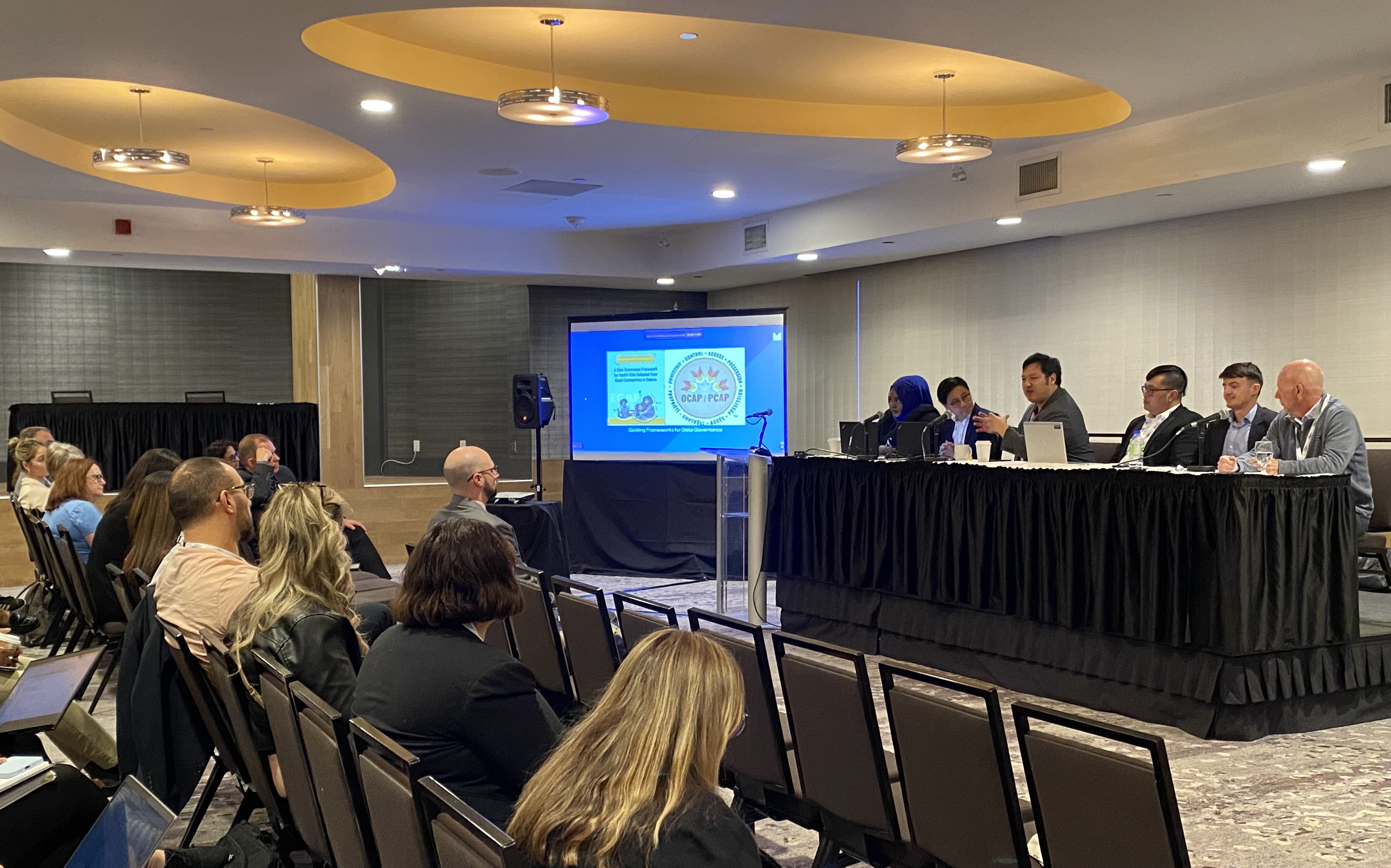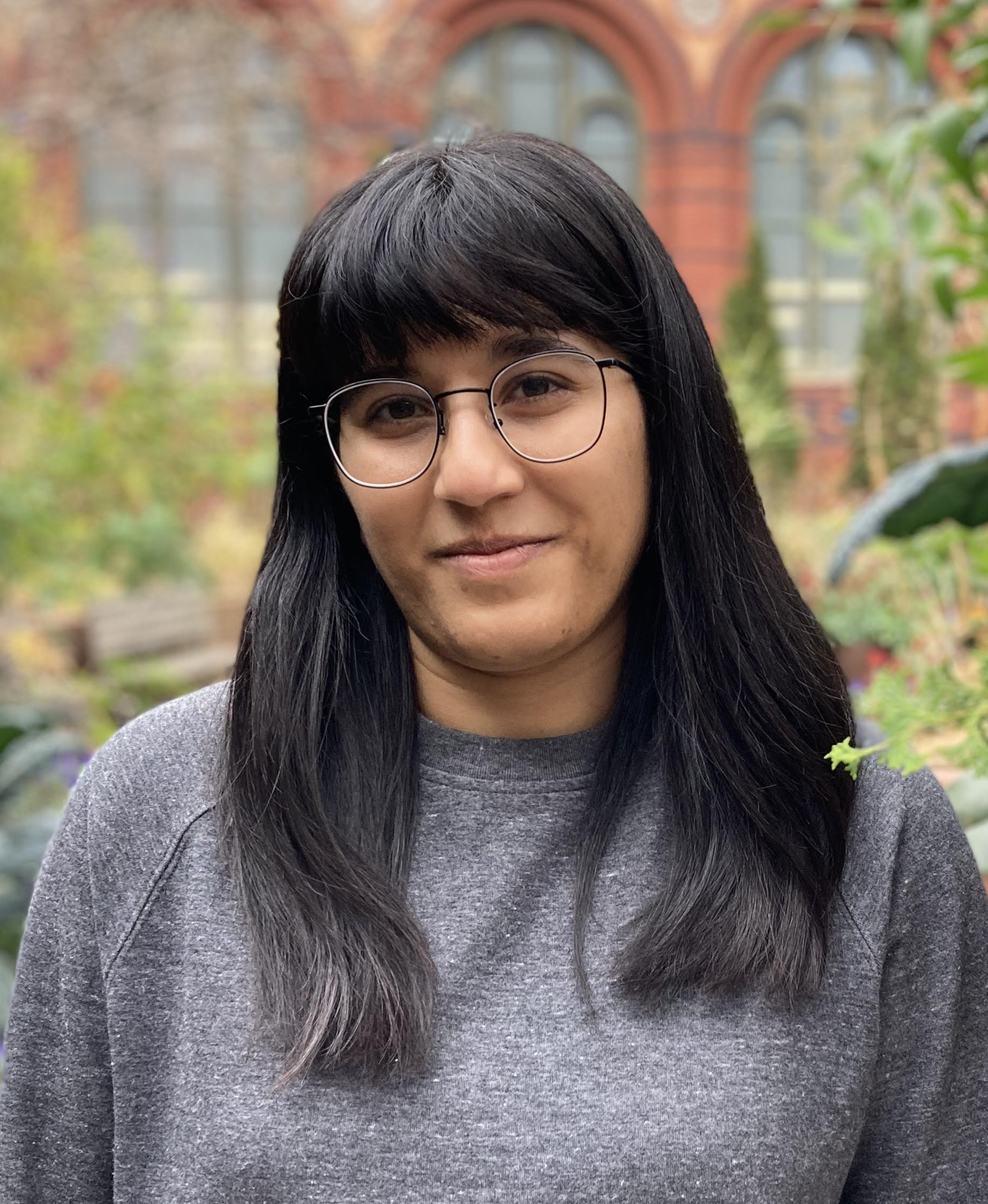Highlights of the 2024 Exchange Conference
Highlights of the 2024 Exchange Conference
By: Nalisha Sankreacha
August 2024
Over 400 people from the human services, health, child care, and public services participated in OMSSA’s in-person Exchange Conference held on May 7 and 8 in Mississauga. Over these two days there was an opportunity to focus on several important professional development topics, enhance skill sets, and showcase the innovative work happening in each of our sectors to address the most pressing issues in our local communities.
Plenary Sessions:

This session focused on the current and future state of our care economy, the growing role of private equity, and the impact on social services. The speakers remarked that human services staff, while working under impossible conditions with impossible choices, are the backbone of the care economy and need to continue to fight for upstream investments. It was also emphasized that now, more than ever, data is vital to make the economic case of why what human services does is vital to the health of our economic engine.
Day one concluded with four presentations from Durham, Halton, Peel, and York about their Community Safety and Well-Being Plans, with a focus on dashboards, micro-granting, welcoming newcomers, and toolkits. There was also a presentation from the City of Toronto about their Community Crisis Service and their nuanced approach to re-imagine a non-police model for mental health crisis responses that is client-centred, trauma-informed, and reduces harm.

Finally, day two and the full conference concluded with a look into our changing world with Tricia Williams from Future Skills Centre. Tricia spoke about job disruptions with the transitioning energy economy, changing demographics due to our low birth rate and aging population, and skills that will continue to be fundamental in the future of all workforces, notably: critical thinking, monitoring, coordination, judgement, and decision making, and complex problem-solving.
Breakout Sessions:
Along with the core plenary sessions at the Conference there were also a number of breakout sessions where Members and non-Members were able to share ideas and innovations to address complex challenges in housing, homelessness, data collection and analysis, newcomer settlement, child care, and more. Below are some short summaries on some stand-out sessions:
Improving Homelessness Policies at Both the Micro and Macro Levels

Abe Oudshoorn from Western University kicked off the session from a macro-level looking at the broader homelessness policy landscape. He asked a vital question: what would it take to end homelessness? Oudshoorn addressed this question by discussing system failures, why it is imperative focus on the intensification of deeply affordable supply, and who should be involved in this process.
Nick Kerman from the Centre for Addiction and Mental Health followed this presentation by discussing shelter-based violence. Kerman spoke about increased violence in shelters during the pandemic and a key factor being overcrowding. He also discussed the importance of service providers being present on the floor, checking-in with service-users, and debriefing after incidents.
Finally, the third and final presentation in this session featured Anna McGregor from Dufferin County, Danielle Neilson from St. Thomas, and Lori Richer from the Canadian Alliance to End Homelessness, who spoke about leveraging data to measure system performance, identify problems, and drive reductions in homelessness. The five key elements mentioned included: a shared aim to end homelessness in their communities, leadership coordination, feedback loop with the By Name List, strategic use of resources, and rapid response discipline.
Culturally Inclusive Programs in Children's Services

Niagara kicked things off by speaking about their Indigenous-Led Registered Early Childhood Educator (RECE) Training Program, where Niagara Region Children’s Services team came together with the Fort Erie Native Friendship Centre, Niagara College, and Six Nations Polytechnic to brainstorm ideas that could add culturally appropriate staff to local Indigenous early years program delivery.
During this presentation Satinder Klair and Jennifer Butera from Niagara, alongside Jennifer Dockstader from Fort Erie Friendship Centre spoke about how students in the in the RECE program were supported through fully funded tuition and wraparound supports. One key message during the presentation was not to let a good idea be strangled by policy; change policy so the good idea can flourish. More information can be found in this full length blog post.
This presentation was followed by Dimple Bal from Brantford who spoke about Building Belonging, a collaboration between the Brantford Immigration Partnership, Community Living Brant, Child and Family Services of Grand Erie, YMCA Immigrant Services, the Brant Haldimand Norfolk Catholic District School Board, and the City of Brantford.
Build Belonging has successfully increased attendance from diverse families by 40% by including culturally informed programming, art, books, toys in EarlyON programs. Importantly this work was done through community consultation and hearing directly from families about their experiences and needs. Bal noted that the elements of success included: creating a physical environment that reflected cultural diversity, meeting the special needs of children and adults, and bringing in celebrations and food from different cultures. More information can be found in this full length blog post.
The Ontario Human Rights Commission: A Human Rights-Based Approach for Municipal Services
After such positive reception at our 2023 Policy Conference, we brought this session back for our Exchange Conference. Juliette Nicolet spoke about the Ontario Human Rights Commission’s Human Rights Based Approach (HRBA) Framework as a how-to guide for supporting policy, program and service system planning and implementation in a way that mitigates discrimination populations in communities. During this session it was emphasized that human rights are often mistake for equity, diversity, and inclusion (EDI). However, EDI is about changing hearts and minds; there is no legal requirement to do that. Human rights are a legal requirement and are not about people feeling safe, but actually being safe. To do this work it is critical to document everything, get qualitative and quantitative data, and build meaningful relationships with communities and organizations.
Engaging and Leveraging Lived Expertise

Using a co-production approach, the two innovations included a board game for youth designed to improve tax literacy, and a Financial Help Hub (FHH), which is a walk up interactive kiosk where people living with low income can readily access financial help information.
To create these innovations the team engaged service providers and people with lived experiences to think of solutions that would for the intended audience. As a result of this approach, service users were genuinely interested in using the programs because they helped design them.
This presentation was followed by Jeffrey Sinclair from the Regional Municipality of Niagara and lived expert Marni Katzman who spoke about Niagara’s unique low-barrier approach to engaging and promoting the voices of lived experts as part of Niagara’s 10-year Housing and Homelessness Action Plan. Part of the success of this engagement was the co-creation of mutual expectations for this Lived Expert Advisory Group, as well as low barriers to participation, such as no terms of reference and no strict rules about the number of meetings lived experts needed to attend.
The dialogue that came after both these conversations focused on the importance of establishing trust and a sense of safety, as well as being transparent about the decision-making process to help mitigate any disappointment when a participants’ ideas can’t be moved forward. Moreover, the presenters also spoke about the importance of providing compensation, transportation, peer support, and professional development for those participating in engagement sessions.
Innovations in Technology and Data Analysis

The City of Toronto spoke about SCALE (SafeTO Collaborative Analytics and Learning Environment) which is used by multiple public sector entities to coordinate activities related to SafeTO, Toronto’s Community Safety and Wellbeing Plan. The presenters showed several tools, such as their Public Dashboard, Heat Map, and Critical Incident Power BI Dashboard. To conclude, they spoke about the importance of community data governance and the ethical use of data.
The City of Ottawa followed this presentation by speaking about their web scraping technology. Interestingly, this project was born from a side passion project where one of the speakers developed this tool to find cars. This idea and his tool were repurposed to support caseworkers in getting a sense of average market rent in different neighbourhoods through an easy-to-use dashboard. The presenters spoke about how this tool was created and how it was used for a Rapid Rehousing Pilot in Ottawa. Importantly, it was noted while collecting the data is vital, it is equally important to build relationships with the right people and to ensure the data is not used to tell a skewed narrative.
The Exchange Continues to Grow!
On behalf of OMSSA, we are so grateful for the committee members, presenters, and attendees for making this year’s Conference a success. This is the second year that we have opened a call for proposals for our Exchange Conference. We want to thank all those who submitted and made possible to create this fantastic event. This year’s Conference was one of our largest and hope this event will continue to grow to allow human service professional to connect and share their innovative ideas, projects, and programs.
The 2025 OMSSA Exchange will take place from May 12-14 at the Delta Toronto Airport Hotel and Conference Centre. Our Call for Proposals will be sent out in September. Stay tuned for more information and if you are interested in participating on the committee, please contact us at education@omssa.com.
About the Author

Nalisha is the Education and Events Coordinator at OMSSA. She works with our many facilitators to ensure our workshops are seamless, inclusive, and impactful. She also works to research content and speakers for our conferences and forum. Nalisha is passionate about creating thought-provoking programming that captures the diverse needs of our members, equipping them to address complex societal, environmental, and political challenges
Blog categories: Exchange Conference, Professional Development, Care Economy, Community Safety and Well-Being Plan, Housing, Homelessness, Child Care, Indigenous, Human Rights, Lived Experience,